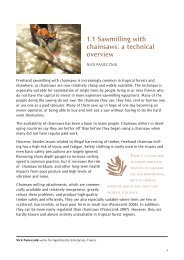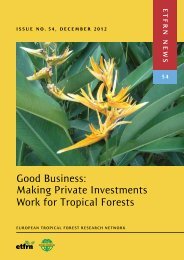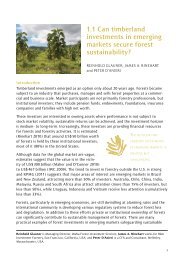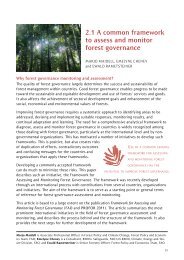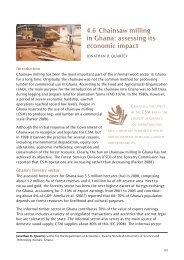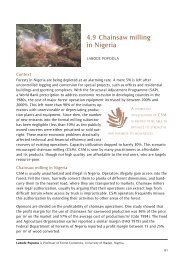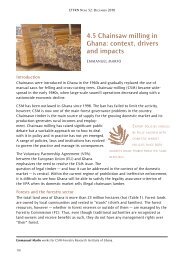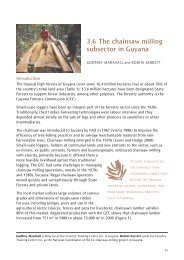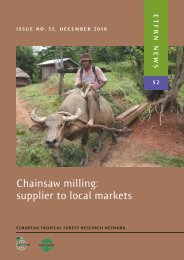Chainsaw milling: supplier to local markets - European Tropical ...
Chainsaw milling: supplier to local markets - European Tropical ...
Chainsaw milling: supplier to local markets - European Tropical ...
Create successful ePaper yourself
Turn your PDF publications into a flip-book with our unique Google optimized e-Paper software.
5.1 DEvElopiNg TimbER lEgaliTy REgimEs<br />
The Eu-FlEGT programme is intended <strong>to</strong> be the first step in achieving sustainable<br />
forest management (<strong>European</strong> Commission 2007). This could be interpreted as signifying<br />
a gradual change from the FlEET scenario <strong>to</strong> the FlETsl scenario. Trajec<strong>to</strong>ries for such<br />
a change may either include the FlETs or the FlEETl scenario. The gradual change from<br />
a FlEET <strong>to</strong> a FlETsl scenario will involve the adaptation from the present, mostly hard<br />
law enforcement approach <strong>to</strong>wards a more soft law enforcement approach. This requires<br />
changes in the legal assurance systems of the timber producing countries, with more<br />
attention <strong>to</strong> social safeguards. at present, the discussions on FlEGT legal assurance<br />
systems are dominated by the need for stakeholder access <strong>to</strong> legal courts and juridical<br />
arbitrage services for dealing with legal infringements. but under the FlETsl scenario,<br />
legal assurance systems should also include governance conditions that enable the<br />
necessary improvements of inadequate legal regulations.<br />
conclusion<br />
<strong>Chainsaw</strong> <strong>milling</strong> is a major example of artisanal timber production. There is a legal<br />
duality between the formal timber sec<strong>to</strong>r and the artisanal timber sec<strong>to</strong>r, but this duality<br />
is not usually recognized in timber legality programmes. in order <strong>to</strong> regularize chainsaw<br />
<strong>milling</strong>, international programmes stimulating timber legality need <strong>to</strong> adapt their<br />
interpretation of what is involved in good forest governance. The currently dominating<br />
focus on stimulating better governance of the formal timber sec<strong>to</strong>r should be further<br />
developed in<strong>to</strong> a focus on better governance of all timber resources.<br />
such a change requires the recognition of a wider range of principles and norms for<br />
timber legality. social norms in respect <strong>to</strong> benefit-sharing and social safeguards need<br />
particular attention. These norms have been formalized in programmes for stimulating<br />
decentralized forms of forest management, but still receive scant attention in<br />
timber legality initiatives. a change in focus from legality as involving technical and<br />
economic issues <strong>to</strong> an approach that also involves social issues requires major changes in<br />
the hard law enforcement processes that currently dominate the discussion.<br />
There is a need <strong>to</strong> mitigate potential adverse social impacts when enforcing the existing<br />
laws that ban chainsaw <strong>milling</strong>. This requires structural innovations in the forest sec<strong>to</strong>r,<br />
with specific attention <strong>to</strong> equitable rights on timber resources and legalization of artisanal<br />
timber production. moreover, the strict law enforcement approach should be complemented<br />
by a soft law enforcement approach that provides incentives for developing alternative<br />
labour and income earning opportunities for <strong>local</strong> people involved in illegal harvesting and<br />
manufacturing, and for rural communities that are involved in illegal timber harvesting.<br />
211



